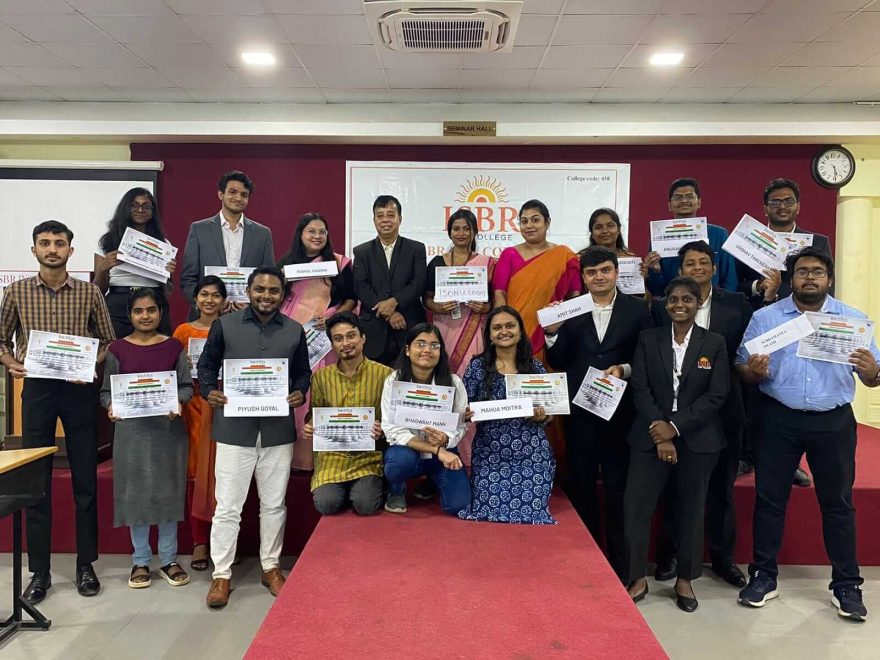Kautilya: Celebrating India’s 75th Independence with Youth Parliament at ISBR Law College
ISBR Law College’s Vox Populi, The MUN & Debating society, proudly presented “KAUTILYA – The Youth Parliament” on August 13-14, 2022, to celebrate 75 years of India’s Independence: Azadi ka Amrit Mahotsav. This unorthodox Indian conference aimed to explore various facets of India’s legacy and sensitize young minds to critical issues. The event brought together a dynamic team of national press, organizing committee members, faculty, participants, and executive board members.
“KAUTILYA” showcased discussions across key committees:
1. Law Commission of India: The Bitcoin Colloquy
The Law Commission members convened to discuss the regulation of cryptocurrency in India, with a special emphasis on its demerits. Recognizing the rapid growth of technological financial products like Cryptocurrency, virtual money, and Bitcoin, the discussion focused on enforcing regulations and control over crypto transactions.
Dr. Sanjay Singh raised concerns about money laundering in cryptocurrency, to which Dr. Rajiv Mani clarified that blockchain technology would be introduced. Dr. Singh further highlighted the vulnerability of crypto to money laundering, potentially funding illegal entities or terror. Members also discussed procedures for recording digital transactions and the formalization of ledger posting for crypto transactions, an area still requiring clarity.
The commission addressed related issues and proposed solutions, discussing a model draft regulation for cryptocurrency in India. This regulation aims to overcome uncertainty, minimize risks to individuals, businesses, and government agencies, and govern facilitating platforms, transfers, exchanges, and services of cryptocurrency. Given the increasing popularity of cryptocurrency trading in India, the need for firm regulation was emphasized, focusing on technological platform models used by intermediaries. Delegates expressed willingness to introduce new schemes, programs, and effectively implement cryptocurrency regulations.
2. Historic – INC: An Unjust Law
This session revisited significant moments in India’s freedom struggle through the lens of “An Unjust Law”. Drawing on Mahatma Gandhi’s philosophy, “An unjust law is itself a species of violence. Arrest for its breach is more so. Now the law of nonviolence says that violence should be resisted not by counter-violence but by nonviolence. This I do by breaking the law and by peacefully submitting to arrest and imprisonment,” the discussion delved into historical movements.
The Non-cooperation Movement, initiated by the Indian National Congress in Calcutta, emphasized nonviolence, Indians resigning titles, boycotting government institutions, foreign goods, and eventually refusing taxes. Despite some successes, it was called off due to its failures, notably after the Chauri-Chaura incident.
The Salt Satyagraha, a massive civil disobedience movement led by Mahatma Gandhi against the salt tax, saw Gandhi and a large following march from Sabarmati Ashram to Dandi to break the salt law. The Civil Disobedience Movement had a far-reaching impact, fostering distrust towards the British government and popularizing new propaganda methods like Prabhat, Pheris, and pamphlets. It also included defiance of forest laws in Maharashtra, Karnataka, and Central Province, and refusal of rural ‘Chaukidari tax’ in Eastern India. The movement concluded with the Gandhi-Irwin Pact.
Both the Non-Cooperation and Civil Disobedience Movements were crucial, with the latter witnessing a significantly larger public participation and detentions.
3. Lok Sabha: Election Amendments
The Lok Sabha committee discussed the Election Amendment Act, 2021. Articles 324 to 329 of Part XV of the Constitution govern India’s electoral system, allowing Parliament to make provisions for elections. Laws like the Representation of the People Act 1950, 1951, and Delimitation Commission Act of 1952 were enacted under this power.
Concerns were raised about linking electoral IDs to Aadhaar numbers, arguing it could help political parties identify favorable or unfavorable voters and potentially lead to large-scale, inadvertent or intentional, deletion of names. This practice was also seen as a violation of the Supreme Court judgment restricting Aadhaar’s use with financial and welfare benefits and barring its unnecessary expansion. The involuntary nature of this linkage and the lack of transparency, leading to data profiling and further problems, were cited as reasons for opposition.
4. Intelligence Bureau: Interview with the Director
The Intelligence Bureau session featured an interview with its Director, addressing pressing national security matters.
On National Security and the Sidhu Moose Wala Assassination: The Director confirmed the assassination of Sidhu Moose Wala (actual name: Singh Sidhu) and addressed media speculations. The IB is actively working with all law enforcement and intelligence agencies, including the Punjab State Police, to reinforce national security under the President’s rule (Article 356 invoked) and stabilize the situation. They are also investigating reviewed intelligence on terror links and expect to bring culprits to justice soon. Two assailants have been apprehended, and investigations are ongoing with other leads, with substantive conclusions expected by the end of the proceedings.
On Transparency in Law Enforcement and Investigation: Regarding transparency, the Director explained they are investigating the murder and addressing the greater threat to national security. While public order and internal security are purely the state government’s mandate, the central government is exercising its rule in Punjab. The quick apprehension of an assailant within a day demonstrates their efficiency. As for overall transparency, a full picture of the broader situation beyond the isolated incident is under investigation. Details cannot be disclosed currently as a report is underway, but national media will be informed once a fair picture is established.
The Kautilya Youth Parliament served as a significant platform for young minds to engage with and understand critical national issues, celebrating India’s rich history and democratic values.

